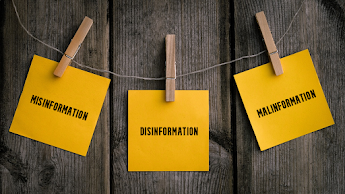Disinformation, Misinformation, and Malinformation are prevalent in our society, so it is important to know the differences and be educated on the topic. Foreign actors use misinformation, disinformation, and malinformation campaigns to cause chaos, confusion, and division. These actors are seeking to interfere with and undermine our democratic institution and national cohesiveness.
The spread of Disinformation, Misinformation, and Malinformation has affected our ability to improve public health, address climate change, and maintain a stable democracy. Overall, the unchecked spread of false or harmful information threatens social stability, governance, and collective well-being.
Disinformation:
Disinformation is deliberately created to mislead, harm, or manipulate a person, social group, organization, or country.
Disinformation is not a new problem, but it has become more prominent with the speed and reach of social media platforms. Disinformation can be spread through word of mouth, memes, speeches, group text messages, news and opinion programming, and nearly any other form of material can be used to spread disinformation. For example, deepfake technology uses AI to create convincing fake images and videos. This technology will bring up challenges in determining the origin and truthfulness of videos which shows how growing technology is making it easier for disinformation to appear as legitimate.
Misinformation:
Misinformation is false but not created or shared to cause harm. Someone can spread misinformation innocently by saying or writing things that are untrue while believing them to be true. For example, a person shares a news report on social media that turns out to be an unreliable news source, and the information is incorrect. This person who shared it believed the information to be true. This is a perfect example, the person thought the information was true and shared it, but turns out it is false. The information was not shared with the intent to cause harm.
Malinformation:
Malinformation is based on fact but used out of context to mislead, harm, or manipulate. It is often private information spread from corporate or personal interest, such as when someone posts intimate photos of an ex-partner online. Another example is selectively sharing true but incomplete information about a political candidate to distort their image and mislead voters. While based on fact, malinformation is weaponized to harm individuals, groups, or institutions, causing reputational, emotional, or social damage.
With the amount of news and information shared daily, we need to be continually asking ourselves, "Why am I believing this? and Does this make sense?" Having various sources where you receive local, state, and national news is another way to be sure the information you are receiving is all true. Disinformation, Misinformation, and Malinformation can affect our society as a whole because we are sometimes given information that we believe to be true, but it was twisted in a way to make it untrue, harmful, or misleading.
The spread of inaccurate or manipulated information can lead people to believe falsehoods, which in turn harms public trust, divides communities, and weakens the democratic processes.
The spread of disinformation, misinformation, and malinformation will have varied impacts across different areas of society. Combating these issues requires a collective effort, including education and better tools for being able to figure out what is true and what is false. We need the cooperation of governments and tech platforms to uphold the integrity of information and ensure platforms contain true information. I hope next time you are reading a news source or hear of information you take a second and ask yourself "Why am I believing this? and Does this make sense?"







No comments:
Post a Comment